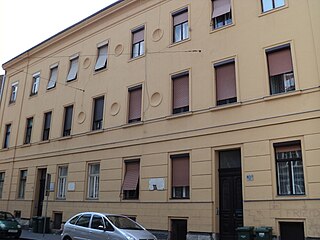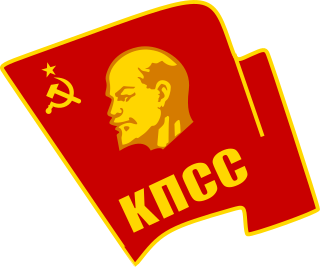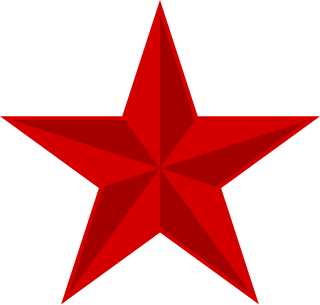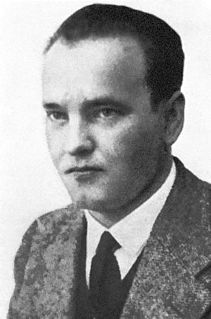
The League of Communists of Yugoslavia, before 1952 the Communist Party of Yugoslavia, was the country's largest communist party, and the ruling party of SFR Yugoslavia. It was founded as an opposition party in the Kingdom of Serbs, Croats and Slovenes in 1919.

The American Negro Labor Congress was established in 1925 by the Communist Party as a vehicle for advancing the rights of African-Americans, propagandizing for communism within the black community and recruiting African-American members for the party.

The Communist Workers' Party of Germany was an anti-parliamentarian and left communist party that was active in Germany during the time of the Weimar Republic. It was founded in April 1920 in Heidelberg as a split from the Communist Party of Germany (KPD). Originally the party remained a "sympathising member of Communist International." In 1922 the KAPD split into two factions, both of whom kept the name but are referred to as the KAPD Essen Faction and the KAPD Berlin Faction.

League of Communist Youth of Yugoslavia, commonly known in English as the Young Communist League of Yugoslavia, or simply Communist Youth, was the youth wing of the Communist Party of Yugoslavia from 1919 to 1948. Although it was banned just two years after its establishment and at times ruthlessly prosecuted, it continued to work clandestinely and was an influential organization among revolutionary youth in the Kingdom of Yugoslavia, and consequently became a major organizer of Partisan resistance to Axis occupation and local Quisling forces. After World War II, SKOJ became a part of a wider organization of Yugoslav youth, the People's Youth of Yugoslavia, which later became the League of Socialist Youth of Yugoslavia.

Communist Party of Latvia was a political party in Latvia.

The Communist Party of Fiume was instituted in November 1921, after the proclamation of the Free State of Fiume created by the Treaty of Rapallo. The Communist Party of Fiume was the smallest Communist Party in the world at the time. It was founded following the principles of the Third International, according to which each sovereign State had to have its own Communist Party organization.
The French Communist Group was a small organization of French residents in Russia, founded in Moscow in October 1918. One of the founders, Jacques Sadoul, had been a French infantry soldier in Russia during World War I but had joined the Red Army and became an organized communist.
The British Communist Group was a small organization of British residents in Russia. The group was affiliated to the Federation of Foreign Groups of the Russian Communist Party (bolsheviks). The group was represented by Joseph Fineberg at the founding congress of the Communist International in March 1919. Fineberg participated as a consultative delegate.

The 2nd World Congress of the Comintern was a gathering of approximately 220 voting and non-voting representatives of Communist and revolutionary socialist political parties from around the world, held in Petrograd and Moscow from July 19 to August 7, 1920. The 2nd Congress is best remembered for formulating and implementing the 21 Conditions for membership in the Communist International.

The 9th Congress of the Russian Communist Party took place from 29 March 1920 till 5 April 1920. The Congress opened in the Bolshoi Theatre with an introductory speech by Vladimir Lenin. The following meetings of the Congress took place in one of the buildings of the Kremlin. Present at the Congress were 715 delegates, of whom 553 had the right to vote and 162 were delegates with voice but no vote.
The 1st Congress of the Comintern was an international gathering of communist, revolutionary socialist, and syndicalist delegates held in Moscow which established the Communist International (Comintern). The gathering, held from March 2 to 6, 1919, was attended by 51 representatives of more than two dozen countries from around Europe, North America, and Asia.
Otto Eduard Gerardus Majella Huiswoud was a Suriname-born political activist who was a charter member of the Communist Party of America. Huiswoud is regarded as the first black member of the American communist movement. Huiswoud served briefly as the Communist Party's representative to the Executive Committee of the Communist International in 1922 and was a leading black Comintern functionary during the decade of the 1920s.

Milan Gorkić or Josip Čižinski was a high-ranking Yugoslav communist. He was a leader of the Communist Party of Yugoslavia (KPJ) in exile from 1932 until 1937 and prominent member of the Comintern.

The All-Russian Congress of Soviets was the supreme governing body of the Russian Soviet Federative Socialist Republic from 1917 until 1936, effectively. The 1918 Constitution of the Russian SFSR mandated that Congress shall convene at least twice a year, with the duties of defining the principles of the Soviet Constitution and ratifying peace treaties. The October Revolution ousted the provisional government, making the Congress of Soviets the sole, and supreme governing body. It is important to note that this Congress was not the same as the Congress of Soviets of the Soviet Union which governed the whole Soviet Union after its creation in 1922.

The Young Communist International was the parallel international youth organization affiliated with the Communist International (Comintern).
The 4th World Congress of the Communist International was an assembly of delegates to the Communist International held in Petrograd and Moscow, Soviet Russia, between November 5 and December 5, 1922. A total of 343 voting delegates from 58 countries were in attendance. The 4th World Congress is best remembered for having amplified the tactic of the United Front into a fundamental part of international Communist policy. The gathering also elected a new set of leaders to the Comintern's governing body, the Executive Committee of the Communist International (ECCI).

The Executive Committee of the Communist International, commonly known by its acronym, ECCI (Russian acronym ИККИ), was the governing authority of the Comintern between the World Congresses of that body. The ECCI was established by the Founding Congress of the Comintern in 1919 and was dissolved with the rest of the Comintern in May 1943.














